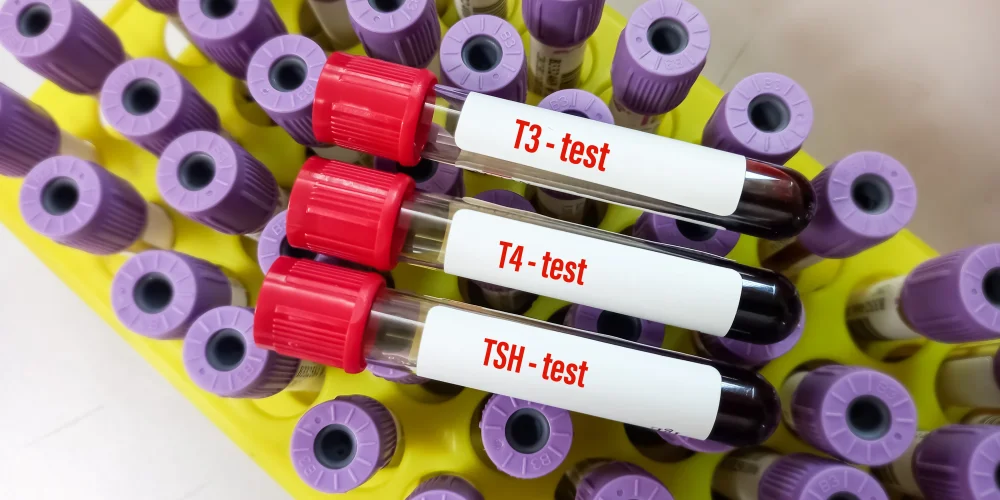T3 T4 TSH Test
Assessing Thyroid Hormone Levels and Function
Tests for T3 T4 TSH tests are crucial tests used for diagnosing the thyroid’s functioning. They measure levels in thyroid hormones (Triiodothyronine T3 – T3 and Thyroxine T4 T4) as well as thyroid-stimulating Hormone (TSH) within the blood. The thyroid gland is crucial roles in the regulation of the metabolism of energy production, as well as overall hormone balance. Examining the levels of these hormones provides useful information about the functions of thyroid gland. aiding in the diagnosis and treatment of different thyroid diseases like hyperthyroidism and hypothyroidism as well as others related disorders.

When are the T3 T4 TSH Tests Prescribed?
T3, T3, T4, and TSH tests are recommended to patients in a variety of clinical situations:
- Diagnostic Thyroid Disorders : To identify disorders such as hypothyroidism (underactive thyroid) as well as hyperthyroidism (overactive thyroid) and can result in an array of symptoms that include symptoms of fatigue, weight fluctuations, and mood disorders.
- Testing Thyroid Health : For patients undergoing treatments for thyroid issues The tests can help to monitor the effects of treatment or alternative therapies.
- General health screening : As part of regular wellness checks, primarily for people with a family history of thyroid issues or symptoms that suggest thyroid problems.
- Evaluation of Symptoms that are Unexplained : To investigate symptoms like unproven weight loss or gain or changes in heart rate and other metabolic disorders connected with thyroid dysfunction.
Preparation for the T3 T4 TSH Tests
A special test preparation is not typically needed for the T3, T4, and TSH tests. Patients can consume food and drinks normal prior to the test. But, it’s important to notify your doctor regarding any supplements, medications or any recent illness because these can alter the test results. Your physician may give specific directions if changes to your prescription are needed.
Parameters Considered During the T3 T4 TSH Tests
- T3 (Triiodothyronine) : Measures the level of hormone T3 vital in regulating metabolism as well as energy production.
- T4 (Thyroxine) : Measures the amount of hormone T4 that is the principal hormone made in the thyroid gland that is transformed into T3 by the body.
- TSH (Thyroid-Stimulating Hormone) : Measures the amount of TSH released from the pituitary gland that regulates the release of hormones like T3 as well as T4 from the thyroid gland.
These measurements provide an extensive analysis of thyroid function aiding in the diagnosis and treatment of thyroid issues successfully.
Time Required for T3 T4 TSH Test Report
Tests for T3, T4, and TSH tests are essentially a blood draw. The procedure is easy and fast. Once the blood sample has been collected the results will be accessible within the next day. This speedy turnaround lets healthcare professionals quickly evaluate thyroid function and suggest the appropriate treatment, or a further examination in the event of a need.
T3 T4 TSH Test Price
In Chirayu Super Speciality Hospital, the combination of T3 as well as T4 and TSH test price is Rs550. The cost-effective and comprehensive testing method provides vital diagnostic tests for evaluating thyroid health. It also assists in earlier detection and management of thyroid issues, as well as helping improve the patient experience.
Book an Appointment for T3 T4 TSH Tests
Scheduling an appointment for your T3, T4, or TSH Test at Chirayu Super Speciality Hospital in Bhayandar is easy and simple. You can book the test on our website or contact our support staff. We are dedicated to providing prompt and efficient services to meet your healthcare needs, ensuring a seamless experience for all our patients.
What Our Patients Say
Hear from our valued patients about their experiences at Chirayu Super Speciality Hospital and how our care has made a positive impact on their health and well-being.


Detailed thyroid function analysis helped manage my symptoms better.


Chirayu Hospital efficient testing process ensured quick diagnosis.


The comprehensive thyroid tests provided valuable insights into my health.


Professional and timely service for my thyroid function tests.


Accurate thyroid testing at Chirayu improved my treatment plan significantly.


Chirayu T3, T4, and TSH tests helped diagnose my thyroid issue promptly.
Frequently Asked Questions
Here, we provide answers to some of the most commonly asked questions to help you better understand our services, policies, and facilities. If you have any additional questions, please do not hesitate to contact us.
Symptoms may include fatigue, weight changes, mood disturbances, changes in heart rate, and temperature sensitivity.
Treatment may involve medication to normalize thyroid hormone levels, lifestyle changes, or, in some cases, surgical intervention.
Yes, certain nutrients like iodine, selenium, and zinc play a role in thyroid health. A balanced diet supports overall thyroid function.
Frequency depends on individual risk factors and health conditions. Consult your healthcare provider for personalized advice.
The tests involve a simple blood draw with minimal risks, such as slight bruising at the puncture site.